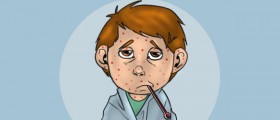
Varicella, also known as chicken pox, is highly contagious viral infection. The disease features with vesicular rash and the vesicles predominantly affect the trunk and the head. These skin changes are itchy and they heal spontaneously without scarring. Only if a person scratches the skin changes they may become infected and the scars may occur.
This disease is transmitted by little droplets that are ejected during coughing or sneezing. Direct contact with the secretions from the rash can also lead to infection. The disease can be serious in adult men and immunosuppressed pregnant women.
Complications of VaricellaShinglesThe most common complication of varicella which occurs in later life is shingles. Shingles is actually a reactivation of the virus. This medical condition is also known as Herpes Zoster. We think that after the infection has gone the virus is eliminated from the body. On the contrary, it stays and situates in ganglia. In elderly people immune system is not acting properly so they are predominantly affected by Herpes Zoster. Reactivation of the virus is also common in immunosuppressed people and those who are suffering from HIV/ AIDS. This medical condition features with painful blisters which are located on the specific area of the skin which is innervated by the nerve whose ganglion is original place of the viral settlement.Bacterial InfectionSecondary bacterial infection is rather frequent complication of varicella infection. The skin changes are susceptible to bacteria if they are scratched and damaged. Staphylococcus aureus and Streptococcus pyogenes most commonly lead to infection of vesicles. The infection may be in a form of furunculosis, carbunculosis, impetigo, cellulitis, or erysipelas. If the bacteria spread onto the deeper tissue they may even enter the blood stream causing bacteriemia which can additionally lead to infection of distant organs including lungs, brain, joints and so on. Neurologic ComplicationsAcute cerebellar ataxia is one possible neurological complication of varicella. It features with problems with walking, increased irritability, problems with vision and speech. These symptoms are reversible. Meningoencephalitis is more serious complication. Fortunately, even this complication can be treated without serious consequences.Respiratory ComplicationsPneumonia is the most common respiratory complication. The virus reaches lungs after it has entered the blood stream. This complication usually does not affect people with healthy immune system. Pneumonia affects elderly patients, people with insufficient immune system, pregnant women, people who are suffering from chronic obstructive pulmonary disease and smokers. Liver ComplicationsHepatitis is another possible complication of varicella. Hepatitis caused by varicella virus is usually asymptomatic and withdraws without any further consequences.

















Your thoughts on this
Loading...